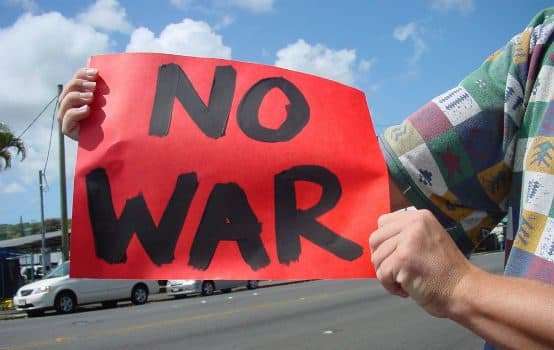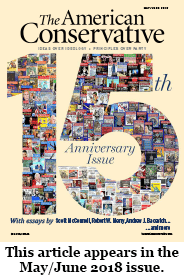
Happy birthday, old friend. Few periodicals have been as impactful on my political development as The American Conservative, and no professional honor has been greater than when I was brought aboard seven months ago to serve as its managing editor. It can only be fitting that I should now be starting work on an essay commemorating TAC’s big one-five only a day after finishing another piece deploring just so many years of the Iraq war. A quick dip into the TAC archives (accessible by an elevator disguised as a tree in Scott McConnell’s yard) should be all the evidence you need that without Iraq our little publication might never have been. That ugly war was TAC’s white whale, the reason its founders were able to assemble such a polymathic bunch of professors and polemicists, traditionalists and libertarians, all united around the conviction that George W. Bush’s bum rush to Baghdad would prove a calamity.
A decade and a half on, it’s tempting to conclude that TAC won the intellectual battle while losing the institutional one. As the forces of history and local peculiarity asserted themselves, Iraq descended into sectarian chaos, and the occupation’s architects were held in public contempt. Yet since then we’ve made the same regime change mistake in Libya and are currently waging war in at least six other nations, with possibly more in store now that the mustachioed maestro of mayhem, John Bolton, has been elevated to the National Security Council. Failure has only hardened the hawkish amber around Washington’s powerful adviser farms, to the point that today the varieties of thought represented in TAC seem only marginally more establishment than they were a decade and a half ago.

To invoke Tom Wolfe, it’s no good being even 10 minutes ahead of the times. And yet, incorrigible optimist that I am, I’d like to think that I’ve located hope in a place where it’s rarely found: the young. We Millennials have been accused in think pieces of ruining a litany of good things—including democracy, marriage, beer, and napkins—but I’d like to posit that American foreign policy is notably not among them. In fact, when it comes to international relations, the kids are all right.
Public opinion surveys about the nuances of foreign policy are difficult to find. It seems that calling people up and asking them whether Iranian Twelver Shiism will prove geopolitically incompatible with the more syncretic practices of the Yemeni Zaidis is apparently not something pollsters think worth their time. But a handful of polls have probed Millennials about their views on war and peace more generally. And, notably, the result consistently has been a preference for restraint. A Pew poll from March 2018 found that, while 12 years ago there were scant differences of foreign policy opinion between Millennials and others generations, the divide nowadays is gaping. Fully 77 percent of Millennials think diplomacy is a better way to preserve the peace than military force, compared to 52 percent of Baby Boomers (born from 1946 to 1964) and 43 percent of Silents (born from 1928-1945). And while 46 percent of Silents said the United States “stands above” all other nations, only 18 percent of Millennials agreed. That isn’t to say the young are monolithically dovish: a 2015 Harvard Institute for Politics survey found that 60 percent of those aged 18 to 29 thought ground troops would be needed to defeat the Islamic State. But even then only 16 percent said they already had or would be willing to enlist to get the job done, a telling chasm between the personal and the political.
What’s going on here? A. Trevor Thrall and Erik Goepner of the Cato Institute put Millennial foreign policy views under the microscope and came away with three conclusions: first, the young perceive the world as less threatening than their elders; second, they value international cooperation more than other cohorts; and, third, they’re more circumspect about using military force overall. All of that is true, but I would suggest a sine qua non: Millennials’ aversion to war stems from their deep skepticism of the national institutions around them. A recent Harvard poll found that majorities of the young hold in contempt a long catalogue of societal authorities, including the media, Wall Street, the federal government, Congress, the Supreme Court, and the police. Only scientists and (ironically) the military escaped unscathed, and the armed forces only just made the cut at 53 percent approval.
This cynicism understandably has fed a stereotype of the Millennial as a precious atomized individual, strutting about with Muse lyrics thrashing out of his ear buds, reserving tolerance for all and sparing side eyes for none. And while some of that is accurate, a little history can offer a richer portrait.
♦♦♦
Most Millennials grew up during or at least with a faint memory of the 1990s, that pacific confettiscape of a decade with its consumerist it-goods and post-Cold War American dominance, its Nerf gun commercials blaring out of the TV, and little green stock market arrows beckoning ever upwards. Then came 9/11. And, just as Sebastian Flyte proves portentous in Brideshead Revisited when he laments to Charles Ryder that “it’s rather sad to think that whatever happens you and I can never possibly get involved in a war,” so, too, did youthful restlessness in the tranquil 1990s give way to a sense of martial purpose.
A barbaric strike at the heart of the American enterprise—Millennials enlisted by the thousands and shipped off to Afghanistan (though it certainly wasn’t of a magnitude seen after Pearl Harbor). While we were generally more suspicious of America’s military campaign than our elders, the idea of rebuilding the Middle East appealed to the spirit of reform that’s so often wrought out of adversity in the hearts of the young. And when the Taliban was quickly toppled by a relatively painless show of might (or so we thought), it seemed the world really was about to be changed for the better.
As I noted in my Iraq war anniversary piece, the idealism that underpinned the nascent war on terror was both deeply radical in its ambitions and inculcated in places far more powerful than the 18-to-25 demographic. In his first major speech after 9/11, no less an adult than George W. Bush charged his countrymen with a starry-eyed mission: “to answer these attacks and rid the world of evil.” His call was echoed by right-wing pundits who churned out books with white-hot titles: An End to Evil and Deliver Us From Evil.
The ethos of the moment was best captured by a Hegel quote that had been ominously parroted by Francis Fukuyama a decade earlier: “We stand at the gates of an important epoch, a time of ferment, when spirit moves forward in a leap, transcends its previous shape and takes on a new one.” Just as leftist radicals two generations earlier had declared war on inequality and poverty, so too were humanity’s conceptual defects—authoritarianism and even wickedness itself—to be put to the sword. It was through the lens of this jejune mania that we decided Iraq, not al-Qaeda in Pakistan, must be our next target, as enlarged as our focus had become beyond just crushing the 9/11 culprits.
Those dreams would soon dissipate into so much smoke over the desert. We stormed into Iraq only to become ensnared in what would become a decade-plus-long quagmire that shook not just our post-9/11 idealism but our perception of America as the world’s good and unipolar superpower. Those of us who had grown up thinking we lived in a providentially invincible nation were suddenly confronted with images of flag-draped coffins and Humvees belching up orange flames.
And then came the second punch in the one-two: the global recession that would immolate $13 trillion in wealth, just in time for many of us to enter—this term was now laden with even more foreboding—the real world. Millennials suddenly faced underemployment and salaries too low to finance their student loan payments. That sent many of them back to live with their parents after college and positioned many more on a paycheck-to-paycheck knife’s edge. Social Security, we knew, wasn’t going to be there for us either, and health care costs only continued to increase after Obamacare was passed.
This fraught reality was far removed from the charmed decade in which we grew up, and the juxtaposition between the two is essential to understanding the Millennial mind. Such a collapse, we knew, hadn’t come about on its own: there were agents of this destruction, and they had warmed powerful chairs in Washington and on Wall Street. Why do we so distrust our institutions? They failed us, for one thing. None of this is to excuse our vanity, our lack of savings, our many other self-inflicted problems. It’s also not to wallow in self-pity, proud Millennial tradition though that might be. It’s only to acknowledge the reality that we came of age during a period of sustained policy failure, and to expect this not to color our outlook would be unrealistic. If you want to understand why the senescent socialist Bernie Sanders appeals to many Millennials, consider that the West’s Cold War struggle against Marxism wasn’t our formative event; the Bush presidency was, and it was Sanders who promised the cleanest break with the militarization and corporate plunder that many regard as that administration’s hallmarks.

The military is one demographic that isn’t smitten by Bernie, yet even the historically right-wing culture of the armed forces has soured on humanitarian war. A remarkable Military Times poll from September 2016 found that 55 percent of active duty troops said they “strongly oppose” or “somewhat oppose” more nation building and democracy promotion abroad, against only 23 percent in support. (Remember that in the unlikely event you see another one of those yellow “support the troops” bumper magnets.)
Instead, majorities of service-members preferred that Washington focus on the military’s more traditional duties of national defense: counterterrorism, protecting the homeland, cyber-security, and nuclear deterrence. It was unsurprising, then, that a plurality of the armed forces said they backed Donald Trump over Hillary Clinton, according to another Military Times survey that same year. Much more shocking was that Hillary didn’t even come in second place. That honor went to Gary Johnson, the Libertarian candidate, so averse to invading Syria that he studiously avoided knowing what an Aleppo was. It was a faint echo of the 2008 and 2012 campaigns when the dovish Ron Paul outraised his Republican and Democratic rivals among contributions from active duty troops.
These data was fleshed into anecdote for me a few years ago when I met a young veteran at a party. Over several beers we got to talking, and he mentioned that he had served in Iraq. This was just after ISIS had conquered Fallujah, and I offered that he must be furious, given how many Marines had died trying to retake that city a decade earlier. Not really, he said. His reaction had been more of a fatalistic ho-hum, a shrug and an admission that such a dire outcome was probably inevitable. There was, he told me, no appetite among his fellow service members for another expedition back to Iraq, nor to any other exotic land. Instead, a sense of skepticism and even listlessness had settled in, especially among those who had grown up with the Iraq and Afghanistan conflicts and couldn’t believe those theaters were still so hot. I asked whether this condition could be described as a “hangover.” Yes, he said, though it was nothing compared to the hangover he intended to have the next morning. Then he took another swig of beer.
♦♦♦
Military and civilian, left and right, the result of this chastening by Iraq has been a generational wariness over preventative war unseen since the Vietnam Syndrome of the 1970s and 1980s. Instead of mapping out a new Middle East, Millennials have instead turned to domestic politics, with an emphasis on issues such as climate change, inequality, and the economy that’s caused them so much trouble. The young remain vaguely internationalist—they certainly don’t subscribe to Donald Trump’s vision of nationhood, which they regard as cramped and even bigoted—but they tend to interpret that internationalism as meaning America must be made worthy of the rest of the world rather than the other way round. Barack Obama with his wooly-headed idealism, Donald Trump with his insistence on rebuilding the United States rather than Iraq, and Hillary Clinton with her outwardly sanguine feminism have all appealed to segments of the Millennial demographic. And, while mainline, rah-rah-Ronnie conservatism still lives on in many of the right’s activist houses, the changing times have seen many young Republicans head in different ideological directions than their parents.
The most visible manifestation of this shift right has been the rise of libertarianism. Head to the Conservative Political Action Conference (CPAC), the popular right’s annual world’s fair, and you’ll find a palpable divide—older attendees who revere Newt Gingrich and talk of three-legged stools; and college students who say they have libertarian streaks and tend to indulge them after hours. The old jape about libertarians is that they’re just Republicans who want to smoke pot; a more charitable (and perhaps overlapping) assessment is that they’re rightward-inclined Millennials determined not to repeat the Bush administration’s mistakes, most of which involved the use of federal power. Many of these libertarians were inspired by the 2008 and 2012 presidential campaigns of Ron Paul, which, similar to the Sanders surge, saw an elderly candidate succeed in reviving old ideas because to the young they seemed novel and divergent. Paul’s achievement was to show that you could remain of the right while still cutting a path around the GOP’s detested foreign policy, a legacy that his son Rand continues today.
Another alternative to the hoary GOP of yesteryear is the force of cultural reaction that has arisen on the right, and here leaden terms clunk about: alt-right, alt-lite; ethno-nationalism, civic nationalism. Some in this group are fans of relatively mainstream figures such as University of Toronto professor Jordan Peterson and TV talk-show host Tucker Carlson; a few have embarked down the dark and sinuous path that swallowed white supremacists such as Richard Spencer many years ago. But the mainstream of this group is what matters, and they firmly reject the global altruism espoused by the Iraq war’s architects. Instead, they seek a revitalization of America, distinct from other nation-states yet friendly towards them so long as they give us, in the Tommy-Killian-on-the-phone syntax of Donald Trump, “a fair deal.” Many of them are at least sympathetic to Trump and Britain’s efforts to decamp from the European Union, and while most would acknowledge Vladimir Putin as an unsavory character, they appreciate that he looks out for his homeland’s national interests. This group views a strong and self-confident citizenry as a necessity. Political correctness to them is poison, as is the left’s debauching of our educational institutions.
The third ascendant alternative to neoconservatism is the most nascent and the most interesting: call them neo-traditionalists, if only for lack of a better label. These are mostly Catholic thinkers who deplore not just the loss of a common American culture but the vitiation of the Christian ethic that once provided the country with spiritual nourishment. This group worries about problems that more mainstream political observers tend not to notice: loneliness, materialism, sexual anarchy, pornography addiction, our throwaway culture of disposable stuff, the loss of any credible moral authority to steady our ship’s wheels. Theirs is a response not to anything so political as the Bush administration, but to that aforementioned cynicism towards institutions, which they charge has left man alone and shivering, in possession of rights but lacking in guidance as to how to use them. In concord with the Notre Dame academic Patrick Deneen, they align themselves against our modern conception of liberalism and the merciless globalism and corporatism that they believe have displaced the permanent things.
♦♦♦
These three strains don’t always overlap—the neo-trads are especially disdainful of the libertarians—but they do have two things in common. The first is that none of them is especially hawkish on foreign policy. The crusade to end evil abroad always rested on the assumption that America was unalterably good at home: what these schools acknowledge is that we have problems here, now, problems that are towering and can only be addressed by violating the neocons’ and liberal interventionists’ shrieking proscription against “looking inwards.” For the libertarians, that means addressing police brutality and the national debt; for the nationalists, it means stopping political correctness and mass immigration; for the trads it means bringing liberty and order into harmony.
And if those causes sound familiar, that’s because the second thing they have in common is that all are regularly espoused here in The American Conservative. So Sláinte. The old Goldwater mystique has some application yet: sometimes in losing you really do win, and at least when it comes to the foreign policy argument, TAC has won. Whether we now translate this intellectual victory into political and institutional success remains an open question.
Matt Purple is managing editor of The American Conservative.
Sourse: theamericanconservative.com






